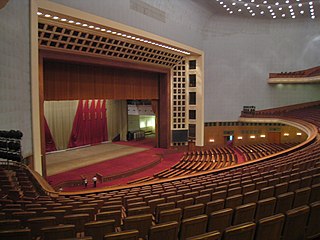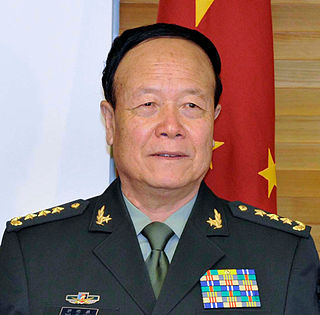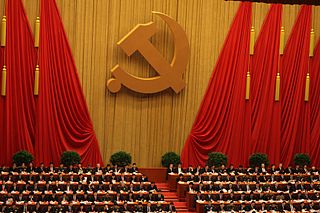Related Research Articles
The orders of precedence in China is the ranking of political leaders in China for the purposes of event protocol and to arrange the ordering of names in official news bulletins, both written and televised. It is also sometimes used to assess perceived level of political power. Although there is no formally published ranking, there is usually an established convention and protocol, and the relative positions of Chinese political figures can usually be deduced from the order in meetings and especially by the time and order in which figures are covered by the official media. Since 1982, the General Secretary of the Chinese Communist Party has been the highest-ranking official in the People's Republic of China (PRC).
The Shanghai clique, also referred to as the Shanghai gang, Jiang clique, or Jiang faction, refers to an informal group of Chinese Communist Party (CCP) officials who rose to prominence under former CCP General Secretary Jiang Zemin while he served as the party chief and mayor of Shanghai.

The 16th National Congress of the Chinese Communist Party was held in Beijing between November 8 and 14, 2002. It was preceded by the 15th National Congress and was succeeded by the 17th National Congress. 2,114 delegates and 40 specially invited delegates represented the party's estimated 66 million members.

Bo Xilai is a Chinese former politician who was convicted on bribery and embezzlement charges. He came to prominence through his tenures as Mayor of Dalian and then the governor of Liaoning. From 2004 to November 2007, he served as Minister of Commerce. Between 2007 and 2012, he served as a member of the Politburo of the Chinese Communist Party (CCP) and Communist Party Secretary of Chongqing, a major interior municipality. He was generally considered the main political rival of Xi Jinping before Xi became the paramount leader of China.

The 17th National Congress of the Chinese Communist Party was held in Beijing, China, at the Great Hall of the People from 15 to 21 October 2007. Congress marked a significant shift in the political direction of the country as CCP General Secretary Hu Jintao solidified his position of leadership. Hu's signature policy doctrine, the Scientific Development Concept, which aimed to create a "Socialist Harmonious Society" through egalitarian wealth distribution and concern for the country's less well-off, was enshrined into the Party Constitution. It was succeeded by the 18th National Congress of the Chinese Communist Party.
The 16th Politburo of the Chinese Communist Party (CCP), formally the Political Bureau of the 16th Central Committee of the Communist Party of China, was elected at the 1st Plenary Session of the 16th Central Committee of the CCP on 15 November 2002 in the aftermath of the 16th National Congress. This electoral term was preceded by the 15th Politburo and succeeded by the 17th. Of the 24 members, nine served in the 16th Politburo Standing Committee.
The 16th Central Committee of the Chinese Communist Party was in session from 2002 to 2007. It held seven plenary sessions. It was set in motion by the 16th National Congress of the Chinese Communist Party. The 15th Central Committee preceded it. It was followed by the 17th Central Committee of the Chinese Communist Party.
The 15th Central Committee of the Chinese Communist Party was in session from 1997 to 2002. The 14th Central Committee preceded it. It was followed by the 16th Central Committee of the Chinese Communist Party. This was the first Central Committee that current CCP general secretary Xi Jinping was elected to, as an alternative member.

Guo Boxiong is a former general of the People's Liberation Army of China. He served as the Vice Chairman of the Central Military Commission, China's top military council, between 2002 and 2012. During the same period he also held a seat in the Politburo of the Chinese Communist Party, China's top decision-making body. He was expelled from the Communist Party on 30 July 2015. On July 25, 2016, he was sentenced to life imprisonment for bribery.

The 18th National Congress of the Chinese Communist Party was held November 8-15, 2012 at the Great Hall of the People. It was preceded by the 17th National Congress of the Chinese Communist Party. Due to term limits and age restrictions, seven of the nine members of the powerful Politburo Standing Committee (PSC) retired during the Congress, including Hu Jintao, who was replaced by Xi Jinping as General Secretary of the Chinese Communist Party. The Congress elected the 18th Central Committee of the Chinese Communist Party, and saw the number of Politburo Standing Committee seats reduced from nine to seven. It was succeeded by the 19th National Congress of the Chinese Communist Party.
The succession of power in China since 1949 takes place in the context of a one-party state under the Chinese Communist Party (CCP). Despite the guarantee of universal franchise in the constitution, the appointment of the Paramount leader lies largely in the hands of his predecessor and the powerful factions that control the Central Committee of the Chinese Communist Party.
The 18th Politburo of the Chinese Communist Party (CCP), formally the Political Bureau of the 18th Central Committee of the Communist Party of China, was elected at the 1st Plenary Session of the 18th Central Committee of the CCP on 15 November 2012 in the aftermath of the 18th National Congress. This electoral term was preceded by the 17th Politburo and succeeded by the 19th. Of the 25 members, seven served in the 18th Politburo Standing Committee.

A far-reaching anti-corruption campaign began in China following the conclusion of the 18th National Congress of the Chinese Communist Party (CCP) in 2012. The campaign, carried out under the aegis of Xi Jinping, General Secretary of the Chinese Communist Party, was the largest organized anti-corruption effort in the history of CCP rule in China.
The 19th Politburo of the Chinese Communist Party (CCP), formally the Political Bureau of the 19th Central Committee of the Communist Party of China, was elected at the 1st Plenary Session of the 19th Central Committee of the CCP on 25 October 2017 in the aftermath of the 19th National Congress. This electoral term was preceded by the 18th Politburo and succeeded by the 20th. Seven of the 25 members served in the 19th Politburo Standing Committee.

Xi Jinping has ruled the People's Republic of China (PRC) under his party and state administration since 2012. He succeeded Hu Jintao as General Secretary of the Chinese Communist Party in 2012, and later in 2016 was proclaimed the CCP's 4th leadership core, following Mao Zedong, Deng Xiaoping, and Jiang Zemin.
The 20th Politburo of the Chinese Communist Party (CCP), formally the Political Bureau of the 20th Central Committee of the Communist Party of China, was elected at the 1st Plenary Session of the 20th Central Committee of the CCP on 23 October 2022 in the aftermath of the 20th National Congress. This electoral term was preceded by the 19th Politburo. Seven of the 24 members serve in the 20th Politburo Standing Committee.
The 17th Politburo Standing Committee, formally the Standing Committee of the Political Bureau of the 17th Central Committee of the Communist Party of China, was elected by the 1st Plenary Session of the 17th Central Committee in 2007, in the aftermath of the 17th National Congress of the Chinese Communist Party (CCP). It was preceded by the CCP's 16th Politburo Standing Committee and was succeeded by the 18th in 2012.
The 18th Secretariat, formally the Secretariat of the 18th Central Committee of the Communist Party of China, was nominated by the 18th Politburo Standing Committee and approved by the 1st Plenary Session of the 18th Central Committee on 15 November 2012, in the aftermath of the 18th National Congress of the Chinese Communist Party (CCP). This electoral term was preceded by the 17th Secretariat and succeeded by the 19th in 2017.
The 17th Secretariat, formally the Secretariat of the 17th Central Committee of the Communist Party of China, was nominated by the 17th Politburo Standing Committee and approved by the 1st Plenary Session of the 17th Central Committee on 22 October 2007, in the aftermath of the 17th National Congress of the Chinese Communist Party (CCP). This electoral term was preceded by the 16th Secretariat and succeeded by the 18th in 2012.
The 16th Secretariat, formally the Secretariat of the 16th Central Committee of the Communist Party of China, was nominated by the 16th Politburo Standing Committee and approved by the 1st Plenary Session of the 16th Central Committee on 15 November 2002, in the aftermath of the 16th National Congress of the Chinese Communist Party (CCP). This electoral term was preceded by the 15th Secretariat and succeeded by the 17th in 2007.
References
- ↑ "List of Political Bureau members of 17th CPC Central Committee". China Internet Information Center. Archived from the original on 31 July 2023. Retrieved 31 July 2023.
- ↑ "Bo Xilai". People's Daily . Archived from the original on 31 July 2023. Retrieved 31 July 2023.
- ↑ "Guo Boxiong". People's Daily . Archived from the original on 31 July 2023. Retrieved 31 July 2023.
- ↑ "He Guoqiang". China Today . Archived from the original on 24 July 2023. Retrieved 24 July 2023.
- ↑ "Profile: Hu Jintao". BBC News. 14 March 2013. Archived from the original on 24 July 2023. Retrieved 24 July 2023.
- ↑ "Hui Liangyu". People's Daily . Archived from the original on 31 July 2023. Retrieved 31 July 2023.
- ↑ "Jia Qinglin". People's Daily . Archived from the original on 24 July 2023. Retrieved 24 July 2023.
- ↑ "Members of the Standing Committee of the Political Bureau of the 17th Central Committee of the Communist Party of China". Beijing Review . Archived from the original on 24 July 2023. Retrieved 23 July 2023.
- ↑ Li, Cheng. "Li Keqiang 李克强" (PDF). Brookings Institution. Archived from the original (PDF) on 24 November 2022. Retrieved 21 July 2023.
- ↑ "Li Yuanchao 李源潮". China Internet Information Center. 16 March 2013. Archived from the original on 23 July 2023. Retrieved 24 July 2023.
- ↑ "Liu Qi". People's Daily . Archived from the original on 31 July 2023. Retrieved 31 July 2023.
- ↑ "Liu Yandong". China Internet Information Center. Archived from the original on 23 July 2023. Retrieved 24 July 2023.
- ↑ "Liu Yunshan 刘云山". China Vitae. Archived from the original on 22 July 2023. Retrieved 23 July 2023.
- ↑ "Wang Gang". China Internet Information Center. Archived from the original on 31 July 2023. Retrieved 31 July 2023.
- ↑ "王乐泉" [Wang Lequan] (in Chinese). The Central People's Government of the People's Republic of China. 24 October 2007. Archived from the original on 31 July 2023. Retrieved 31 July 2023.
- ↑ Pletcher, Kenneth. "Wang Qishan". Encyclopedia Britannica . Archived from the original on 22 July 2023. Retrieved 23 July 2023.
- ↑ Li, Cheng. "Wang Yang 汪洋" (PDF). Brookings Institution. Archived from the original (PDF) on 31 May 2023. Retrieved 21 July 2023.
- ↑ "Wang Zhaoguo". People's Daily . Archived from the original on 31 July 2023. Retrieved 31 July 2023.
- ↑ "Wen Jiabao". People's Daily . Archived from the original on 24 July 2023. Retrieved 24 July 2023.
- ↑ "Wu Bangguo". National People's Congress. 14 March 2013. Archived from the original on 24 July 2023. Retrieved 24 July 2023.
- ↑ Li, Cheng. "Xi Jinping 习近平" (PDF). Brookings Institution. Archived from the original (PDF) on 24 May 2023. Retrieved 21 July 2023.
- ↑ "Xu Caihou". China Internet Information Center. Archived from the original on 31 July 2023. Retrieved 31 July 2023.
- ↑ "Yu Zhengsheng 俞正声". China Vitae. Archived from the original on 22 July 2023. Retrieved 23 July 2023.
- ↑ "Zhang Dejiang 张德江". China Vitae. Archived from the original on 22 July 2023. Retrieved 23 July 2023.
- ↑ "Zhang Gaoli 张高丽". China Vitae. Archived from the original on 22 July 2023. Retrieved 23 July 2023.
- ↑ Wu, Yuwen (12 October 2015). "Profile: China's fallen security chief Zhou Yongkang". BBC News. Archived from the original on 24 July 2023. Retrieved 24 July 2023.